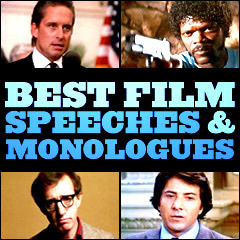
|
and Monologues |
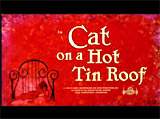
|
Cat on a Hot
Tin Roof (1958)
Maggie Pollitt's (Elizabeth Taylor) longing, pleading to an unresponsive (possibly gay) husband Brick (Paul Newman):
|
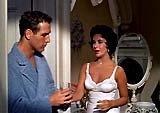
|
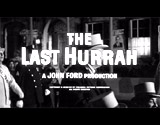
|
The Last Hurrah (1958)
Aging, corrupt Eastern city Irish-American Democratic political boss Mayor Skeffington's (Spencer Tracy) at the age of 72 and running for re-election, told a long story to his idealistic 33 year-old nephew Adam Caulfield (Jeffrey Hunter), a newspaper sports column writer. He described how his Irish immigrant mother, when working as a maid in the home of the father of Amos Force (John Carradine), the current editor of the newspaper, was fired for stealing her employer's food. She was humiliated and then fired by the elder Force for stealing two overripe bananas and a small apple, a "crime" usually accepted by the wealthy Yankees who employed poor Irish immigrants. He argued that the Force family had never forgiven their maid's son for becoming mayor of the city: |

|

|
Vertigo (1958)
Judy's/Madeleine's (Kim Novak) letter written to Scottie Ferguson (James Stewart), and read in voice-over:
|

|

|
Ben-Hur
(1959)
Roman gallery slave master Quintus Arrius's (Jack Hawkins) appraisal of rower Ben-Hur (Charlton Heston), referring to him as Slave Number "41":
|

|
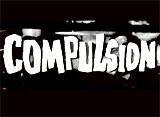
|
Compulsion (1959)
Clarence Darrow-like attorney Jonathan Wilk's (Orson Welles) 10-15 minute eloquent, closing argument against the death penalty is considered the longest true monologue in film history. He was attempting to save two rich young law student-turned-thrill-killers Artie Straus and Judd Steiner (Bradford Dillman and Dean Stockwell) in their court trial. Rather than a contrived defense to prove their innocence before a jury, he conceded that his clients were guilty and instead made an impassioned plea against the state being able to execute two youths regardless of the severity of their premeditated crime. In a brilliant ploy, he decided he would withdraw the plea of not guilty and change it to guilty - to eliminate trial by jury. And he would not plead an insanity case (which would also require the jury). He decided to plead their case solely before the judge.
|
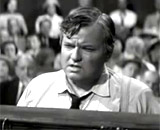 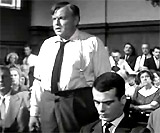 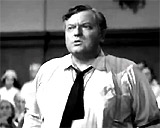  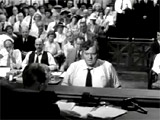 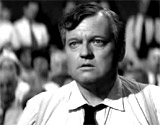
|
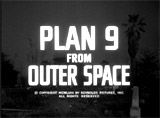
|
Plan 9 From Outer Space (1959)
The bizarre, rambling opening speech by psychic Criswell (as himself) that introduced Ed Wood, Jr.'s infamous film:
|
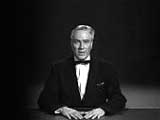
|

|
Some Like It Hot (1959)
Band singer and ukulele player Sugar Kane/Kowalczyk (Marilyn Monroe) gave a 'fuzzy end of the lollipop' speech about bad luck, mostly with saxophone players, to Josephine (Tony Curtis) in the Ladies' Room of the train during a late-night party with the other girls. As she chipped away at a block of ice, she described how she was an abused, melancholy alcoholic running away from all-male bands. Sugar confessed that she had always had bad luck with her lovers, when she easily turned weak from music ("All they have to do is play eight bars of 'Come to Me, My Melancholy Baby' and my spine turns to custard"). She talked to him about how she inevitably weakened and fell for male saxophone players in male groups and then ended up being dumped by them:
|
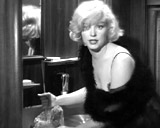 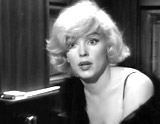 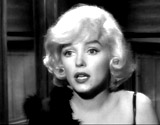 
|
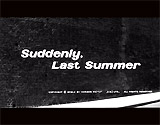
|
Suddenly, Last
Summer (1959)
Pretty Catherine Holly (Elizabeth Taylor), the institutionalized niece of rich widow Mrs. Violet Venable (Katharine Hepburn), was threatened with a 'brain-cutting' lobotomy for telling the truth about a horrifying incident that had occurred the previous summer. She had been invited to join her homosexual cousin Sebastian Venable (never speaking and unseen fully in the film) to travel in Europe together. In the film's climactic monologue (illustrated with impressionistic flashbacks), she described a horrifying chase and surrealistic murder scene when Spanish youths attacked Sebastian (wearing a full white suit). It was hinted that these were boys that Sebastian knew - that he had earlier exploited - and now they were seeking revenge. The assault ended with a cannibalistic homicide at the top of a hill in the ruins of an ancient stone temple:
|
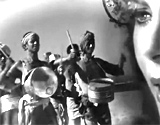 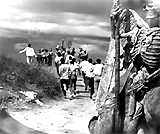   
|
(chronological, by film title) Introduction 1920-1931 | 1932-1935 | 1936-1937 | 1938-1939 | 1939 1940 | 1941 | 1942 | 1943-1944 | 1945-1947 | 1948 | 1949 | 1950 | 1951 | 1952-1954 1955 | 1956-1957 | 1958-1959 | 1960 | 1961-1962 | 1963-1964 | 1965-1967 | 1968-1969 1970 | 1971 | 1972-1973 | 1974-1975 | 1976 | 1976-1977 | 1978-1979 | 1979 | 1980 1981 | 1982 | 1982-1983 | 1984 | 1984-1985 | 1986 | 1987 | 1987 | 1988 | 1989 | 1989 1990 | 1990 | 1991 | 1991 | 1992 | 1992 | 1993 | 1993 | 1994 | 1994 | 1995 | 1995 1996 | 1996 | 1997 | 1997 | 1998 | 1999 | 1999 | 2000 | 2000 | 2001 | 2002 | 2002 | 2003 | 2004 | 2004 2005 | 2006 | 2007 | 2008 | 2009-2010 Greatest Film Quotes Index |